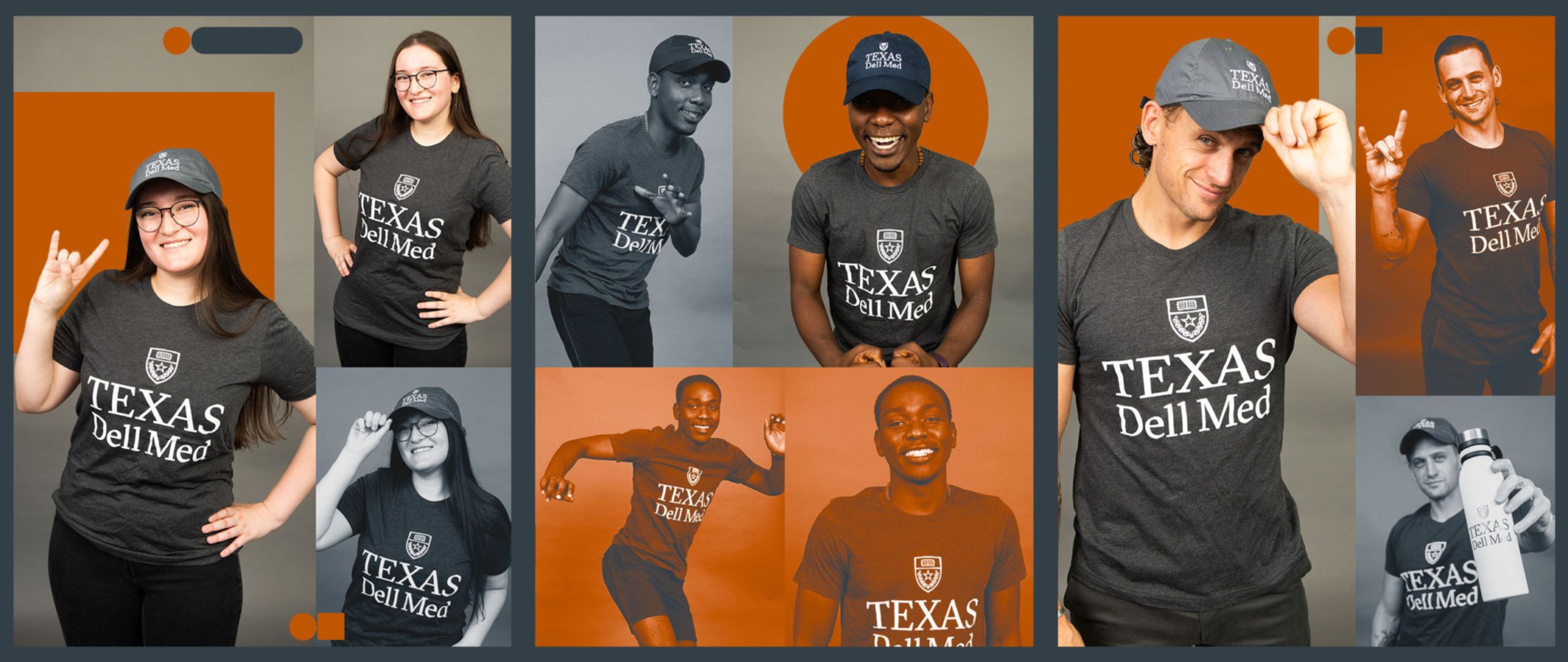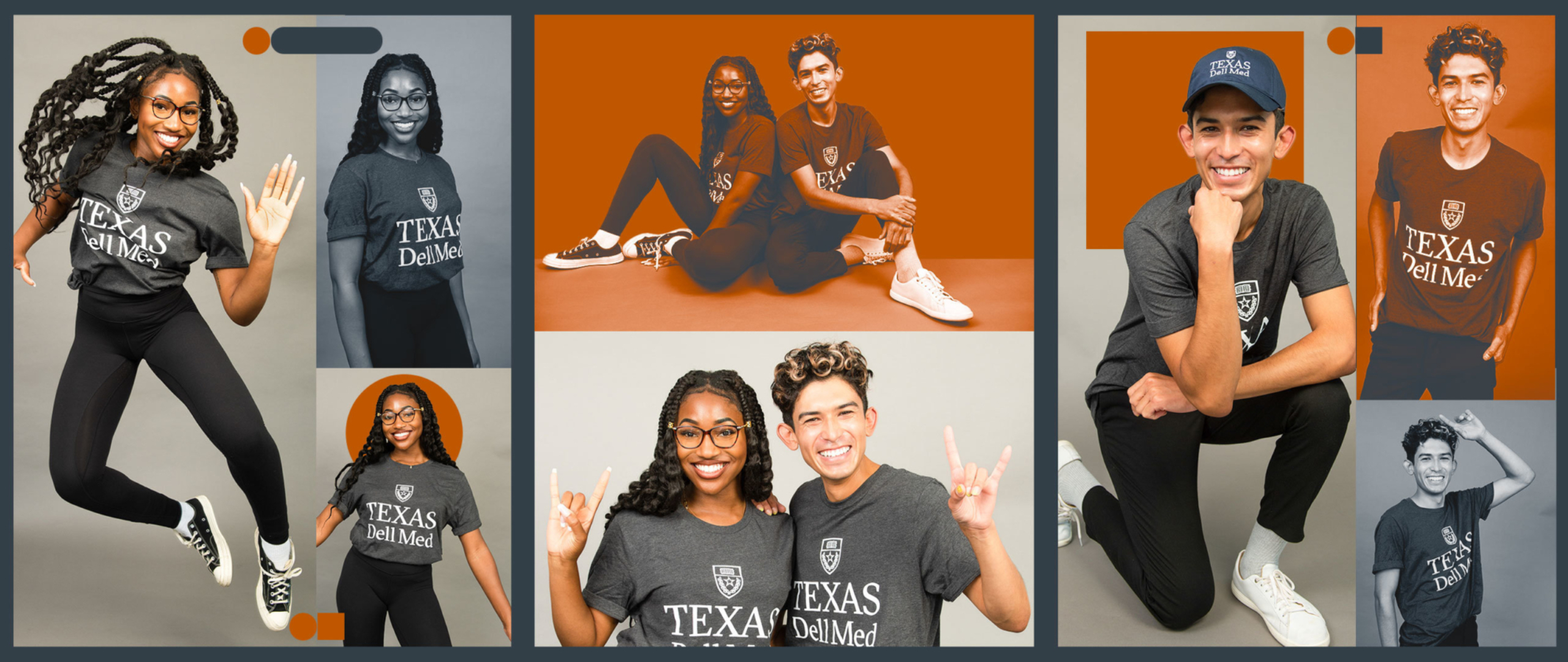Our newest medical students — the next generation of physician leaders — are united by a common goal: health transformation to benefit all.
The 50 students in Dell Medical School’s Class of 2026, ranging in age from 21 to 36, bring both local and global perspectives to their work and studies in Central Texas. Many of them are driven by their own experiences seeking quality, compassionate health care — and a shared goal of improving access for their families and communities.
Meet five of them here.

Ending Health Disparities
Name: Leylee Safabakhsh
Hometown: El Paso, Texas
Alma Mater: The University of Texas at El Paso: B.S., Biological Sciences
Leylee Safabakhsh grew up in a multifaith, multilingual home in El Paso, Texas, where she witnessed health disparity firsthand — broadly, the Texas-Mexico border sees higher rates of obesity, diabetes and other conditions, and nearly a third of patients do not speak English well, limiting health care access. Guiding Safabakhsh in her journey as a future physician leader is her personal motto: “Good thoughts. Good words. Good deeds.”
What motivates you?
Knowing that there is so much that can be done with how health care is currently being delivered in underrepresented populations. Growing up on the U.S.-Mexico border exposed the inequities that immigrants, Spanish speakers and Latines face in the health care system and in the community. The possibility of becoming a physician that can help identify and address the systemic issues that impact my community is the best kind of motivation.
Who’s your hero?
My parents. My mom and dad left Mexico and Iran, respectively, to escape civil unrest — leaving behind family, friends, culture and history for a shot at a better life in the United States. There is nothing I could ever do to exhibit that same amount of courage and resilience.
Defying the Odds to Improve Health Care Access
Name: Mamadou Balde
Hometown: Korse, Bodje (Guinea)
Alma Mater: The University of Texas at Austin: B.S., Chemical Engineering
Growing up in West Africa, Mamadou Balde was inspired by stories of his grandfather, who undertook his pilgrimage to Mecca on foot — a grueling, seven-month journey. Now, Balde applies that same grit and determination to his goal of improving health access to underserved communities.
What were the steps in your journey that made you who you are today?
I knew I wanted to pursue social entrepreneurship as a way to end human suffering. During my undergraduate years pursuing a chemical engineering degree, I co-founded two nonprofit organizations: the Women’s Relief Initiative, which fights menstrual poverty, and Unity Heals, improving health care in impoverished communities. Both of these showed me the importance of medicine in realizing my vision of better lives for all.
What motivates you?
Improving health care access. I was shadowing one of the few cardiologists in Conakry, Guinea, where a mother brought her newborn baby who needed surgery. But there was not a cardiothoracic surgeon in Guinea — the closest was in Dakar. The mother would have to apply for help from a foundation to be able to afford the travel and medical expenses. My mouth fell open as I turned to watch the desperate mother trying to comfort her baby. During my time with that doctor, I learned about so many more cases of people of all ages who perished because they did not have access to someone who could do their surgery or the means to leave the country and get it done somewhere else. Their stories motivate me to defy all odds, climb all mountains and annihilate any walls that are between me and being a surgeon.
From the Navy to the Classroom
Name: Aaron O’Neill
Hometown: I don’t claim anywhere specific but have lived everywhere from rural California to Northern Australia.
Alma Mater: Arizona State University: B.S., Biological Sciences
Aaron O’Neill is not interested in the status quo. A self-described nontraditional student, he believes in making the world a better place for future generations — even if that means shaking things up a bit.
You’re admitted to medical school. Tell us how you got here.
I left home when I was 17 and failed hard at my first attempt at undergraduate education. I have always wanted to go into medicine, but after my initial, unsuccessful attempts at undergrad, I didn’t think a higher education of any caliber, let alone medical school, was in my cards.
I surprised myself (and pretty much everyone who knew me) and joined the U.S. Navy in my early 20s — which was probably the single best decision I have ever made. The Navy put great people and amazing mentors in my path — people who took a sincere interest in my success and saw potential in me that I couldn’t see at the time. Through them I learned some of the life lessons I didn’t quite master growing up: resiliency, self-confidence, how to bounce back from failure, etc. With their support, I went on to finish my undergrad, and the rest is history.
What’s one thing you think needs to be tackled to improve health locally (or globally)?
Poverty. Nothing has ever been made better or easier or healthier through poverty. I have seen firsthand through my mom’s battle with breast cancer what it’s like to face a deadly disease without health insurance or access to affordable treatment. No one should have to forgo lifesaving medical care because they can’t afford it — or feel like they have to choose between living the rest of their life in medical debt or dying of an otherwise treatable disease.

A Physician Deserving of Trust
Name: Chinenye Ogbonnah
Hometown: Lagos, Nigeria, & Houston, Texas
Alma Mater: Stanford University: B.A., Human Biology
Chinenye Ogbonnah has seen what it looks like when patients can connect personally with health care providers. That realization — combined with her knowledge of systemic issues plaguing health care — ignited Ogbonnah’s passion to be a new kind of physician.
What motivates you?
The desire to become worthy of serving disadvantaged communities motivates me. In my experiences in clinical and community service settings, I’ve noticed that certain patients were quicker to trust me than their providers. Since I exist at the nexus of so many marginalized identities, we often had one in common. These experiences showed me that many people are desperate for care from providers they can identify with. Getting the privilege to form these connections along the way was profoundly humbling. I hope to become to be the kind of physician that is deserving of that trust.
Why Dell Med?
I discovered my passion for medicine during my time at a high school medical science academy in Houston, Texas. After learning of the complex problems facing diverse patient populations, I knew I wanted to become a doctor — and more. Over 10 years later, it felt uncanny discovering Dell Med’s mission was to develop this exact type of physician. With the Growth Year, I hope to expand my skill set to attack the problems facing patients on a personal and systemic level. I chose Dell Med’s unique curriculum to maximize my utility to the communities I care about.
First-Generation Student on a Mission
Name: Octavio Zarraga
Hometown: Garland, Texas
Alma Mater: The University of Texas at Dallas: B.S., Neuroscience, B.S., Biology
Octavio Zarraga already has some experience of his own with the health care system: Living with a chronic illness has shaped his life and education — and will continue to inform his approach as a physician.
What are the steps in your journey that got you where you are today?
As a first-generation, nontraditional student, it has been a whirlwind of a journey to be at this stage in my career. During my third year of undergrad, I had to make a difficult decision to take a year off after being diagnosed with an autoimmune disorder. Even after graduation, I had to take the time to heal before spending three gap years working in the nonprofit space in Dallas. Despite the challenges I faced along the way, I would not have had it any other way. These experiences have shaped the type of physician I aim to be, an empathic physician leader that advocates for his patients as they navigate their own health journeys.
What motivates you?
First: the hope to break generational cycles of poverty. Second: the opportunity to uplift the communities I am a part of. I come from a family of farmworkers and fruit sellers near Central Mexico. My dad came to this country not knowing any English and worked hard to ensure that my sisters and I never lacked shelter, food and clothes. Equally important was seeing my mom work full time while attending night school to become a vocational nurse. My parents’ experiences remind me of the incredible privilege that I have in being able to attend medical school.
As a future queer Latinx physician, I want to be a role model to my patients. Representation is important, and I hope to inspire other young students who want to pursue medicine and help them along their own journeys, whether that be as a mentor or their future clinical professor.